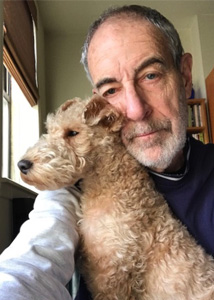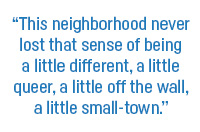 Editor, college professor, and avid bird watcher Andrew Rubenfeld was born in Beth Israel Hospital in 1946. Since 1981, he has been a professor of literature at Stevens Institute of Technology in New Jersey where he teaches courses on American nature and environmental writing. Rubenfeld co-edited “American Birds: A Literary Companion,” published by the Library of America in March 2020 .
Editor, college professor, and avid bird watcher Andrew Rubenfeld was born in Beth Israel Hospital in 1946. Since 1981, he has been a professor of literature at Stevens Institute of Technology in New Jersey where he teaches courses on American nature and environmental writing. Rubenfeld co-edited “American Birds: A Literary Companion,” published by the Library of America in March 2020 .
As a child growing up first in the Bronx and then the suburbs on Long Island, Andrew Rubenfeld was widely exposed to literature, music, and art. So when it came time to go to college, it was a bit of a surprise when his parents suggested he study chemistry. “I was good in chemistry and they wanted me to have a career,” Rubenfeld says. “So I said ‘Okay’ and was accepted to Clark University. However, the summer before my freshman year they had orientation and we had to read Walden before we attended it. The book changed my life! I arrived at Clark as a chemistry major but never took a single chemistry course. Instead I became a literature major from day one. I just knew it was what I wanted to do. And that’s how I really got connected with literature. I ended up doing my masters thesis on English Renaissance literature and my doctorate on Mark Twain at NYU.”
And how did Rubenfeld discover bird watching? “It was in the early 1980s and my partner and I were at Acadia National Park in Maine. It was mid July and teeming with birds. It was also post-breeding so it was full of young birds as well. The park ranger said those little birds were going to fly nonstop to Florida or even Venezuela. So we looked at them through our binoculars and the very next day bought a second pair. We redid the whole trip so we could look at birds. I suddenly had a passion.”
“At some point I started becoming more and more aware of how much American nature writing there is,” he continues. “It’s an integral part of American literature, which includes Audubon, Emerson, Thoreau, and John Muir to name a few. So my teaching and birding just coalesced. This semester I’m teaching a course on Thoreau and American Nature and Environmental Writing. We focus mainly on his work titled The Maine Woods, published posthumously by his sister. It’s a wonderful book. It shows him moving from nature writing to environmental writing as he’s putting it all together. I love teaching, I love American literature, and I love looking at birds. All in all, I think that’s a pretty wonderful combination!”
Rubenfeld considered his efforts on American Birds: A Literary Companion to be “a labor of love.” He had been a contributing editor at the Library of America for over twenty years and knew he wanted them to publish it. “When the topic came up someone asked me to put together a table of contents,” he says. “I had it to them in a week because it was basically my teaching files from school. I’m very pleased with the final product. It’s 300 pages and includes 75 authors. The Library of America is a not-for-profit publisher, so there are no royalties. It’s just fee-for-hire and that’s fine. I sometimes think of it as a gift to my friends and fellow bird watchers. It was a thoroughly enjoyable endeavor.”
 Rubenfeld always wanted to live in the West Village and by the mid-1970s he had accomplished that. “Nothing else even remotely seemed possible for me,” he says. “It just felt right.” And while much has changed, the spirit of the place has remained for him. “This neighborhood never lost that sense of being a little different, a little queer, a little off the wall, a little small-town. The people who moved here knew they were coming to the Village, not just some place in the City. I still get that sense today.”
Rubenfeld always wanted to live in the West Village and by the mid-1970s he had accomplished that. “Nothing else even remotely seemed possible for me,” he says. “It just felt right.” And while much has changed, the spirit of the place has remained for him. “This neighborhood never lost that sense of being a little different, a little queer, a little off the wall, a little small-town. The people who moved here knew they were coming to the Village, not just some place in the City. I still get that sense today.”
“I don’t see the West Village becoming homogenized like any other neighborhood,” he continues. “There are surface changes that reflect changes in American society and culture, but there’s a core set of values that has a lot to do with independence as well as caring. We’re all in it together. We’re in this virus thing together. That aloof New York attitude is just a veneer, something we like to pretend we have. I think the essence of the Village is Do your own stuff, it’s none of my business, but if you need me I’m available. I haven’t seen that change and that’s why I’m still here.”
Photo: Andrew Rubenfeld
